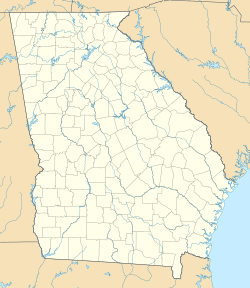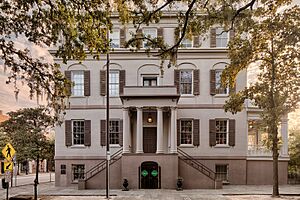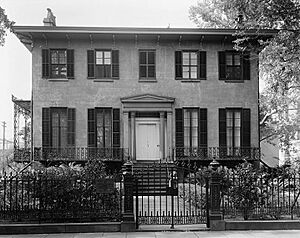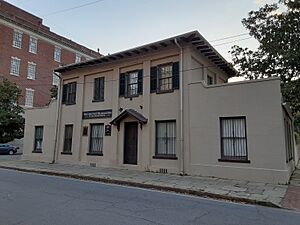Juliette Gordon Low Historic District facts for kids
|
Juliette Gordon Low District
|
|
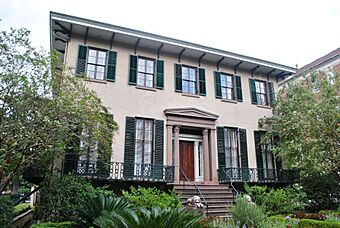
Andrew Low House
|
|
| Location | 10 East Oglethorpe Avenue, 330 Drayton Street, 329 Abercorn Street, Savannah, Georgia |
|---|---|
| Built | 1818 |
| Architect | John S. Norris |
| Architectural style | Early Republic, Italianate |
| Part of | Savannah Historic District (Savannah, Georgia) (ID66000277) |
| NRHP reference No. | 66000276 |
Quick facts for kids Significant dates |
|
| Added to NRHP | October 15, 1966 |
| Designated NHLD | June 23, 1965 |
The Juliette Gordon Low Historic District in Savannah, Georgia, is a special place. It includes three important buildings connected to the start of the Girl Scouts of the USA. These buildings are the Juliette Gordon Low Birthplace, the Andrew Low House, and the Andrew Low Carriage House.
Juliette Gordon Low was born in the Birthplace. She later lived in the Andrew Low House with her husband. The Carriage House became the very first Girl Scout Headquarters. These places are recognized as National Historic Landmarks. This means they are very important to the history of the United States. They are also part of the larger Savannah Historic District.
The Story of the Girl Scouts' Beginnings
Juliette's Childhood Home
The Juliette Gordon Low Birthplace is also known as the Wayne–Gordon House. It was built in 1820 for James Moore Wayne. He was once the mayor of Savannah. Later, he became a judge on the Supreme Court of the United States.
Juliette Gordon Low was born in this house on October 31, 1860. She spent her childhood years growing up there.
The Andrew Low House and Family
The Andrew Low House belonged to Juliette's father-in-law, Andrew Low. When her husband, William Low, inherited the house, it became their American home.
After her husband passed away in 1905, Juliette was living in England. There, she met Robert Baden-Powell. He was the person who started the Boy Scouts. She also met his sister, Agnes, who led the Girl Guides.
Starting the Girl Scouts in America
Robert Baden-Powell encouraged Juliette to get involved with the Girl Guides in 1911. She then returned to Savannah to bring the movement to the United States. In March 1912, Juliette talked to her cousin, Nina Anderson Pape, about forming Girl Guide troops.
Juliette and some girls had informal meetings at the Wayne-Gordon House. On March 12, 1912, she officially started the first Girl Guides troop at the Andrew Low House. This group later became known as the Girl Scouts in 1913.
The First Girl Scout Headquarters
The Andrew Low Carriage House is located behind the main Andrew Low House. It served as the first headquarters for the Girl Scouts until 1913. When Juliette Low passed away in 1927, she left the Carriage House to the Savannah Area Girl Scout Council. The Girl Scouts used this building until 1986.
Preserving These Historic Places
In 1928, after Juliette Low's death, the National Society of the Colonial Dames of America in Georgia bought the Andrew Low House. They still use it as their state headquarters today.
The Girl Scouts of the USA bought Juliette's Birthplace from her family in 1953. They worked hard to fix up the old building. In 1956, a landscape architect named Clermont Huger Lee designed a beautiful garden for the site. The Birthplace opened as a historic house museum in 1956. It shows many original items from the Gordon family, including art by Juliette Low. The museum helps people learn about Juliette's life and the history of the Girl Scouts.
The Buildings' Design
Juliette Gordon Low Birthplace
The Wayne-Gordon House, or Birthplace, was likely designed by English architect William Jay. It was built in 1821 in the Federal style. The house is made of brick covered in stucco, which is scored to look like stone.
This two-story house has a raised basement. Its layout is common for Savannah homes of that time, often called the "Savannah house" style. The Birthplace was a larger version of this style. It featured Regency details like two curved bay windows at the back. It also had fancy plaster cornices and ceiling medallions. Inside, there were marble fireplaces.
In 1886, Juliette's parents renovated the Birthplace. They added a third floor and a side porch. This work was designed by a New York architect, Detlef Lienau. The new third floor included five bedrooms and two bathrooms. The renovation also added a kitchen on the first floor.
The Birthplace still has its original stable, privy, and three small slave houses.
Andrew Low House
The Andrew Low House was built in 1847. It is a few blocks away from the Birthplace. Its design is thought to be by New York architect John Norris. It is a two-story house with a raised basement. It was built in the Greek Revival style from brick covered with stucco. The stucco was scored to look like large stone blocks.
The house has a grand entry portico. This portico was inspired by the Tower of the Winds in Athens, Greece. A brown sandstone staircase leads to the entrance. Two cast iron lions guard the bottom of the stairs. The front door is surrounded by decorative pilasters with capitals shaped like acanthus leaves and lotus leaves.
On its south side, there is a cast iron balcony. It runs along six parlor windows and has beautiful patterns. Inside, the house has a central hall with a passion flower ceiling medallion. The doorknobs are made of sterling silver. The parlors, dining room, and library have black Egyptian marble fireplaces. The second floor has five bedrooms. It also had an original bathing room with running water.
Andrew Low Carriage House
The Andrew Low Carriage House and servants' quarters was built around 1849. It is also known as the First Girl Scouts Headquarters. It has a two-story middle section with one-story wings on each side. These wings connect to the garden walls. It is made of brick covered in stucco.
In 1912, Juliette Low changed the building to make it a meeting place for the Girl Scouts. She closed up the carriage doors facing Drayton Street. She also changed two doors into windows. Juliette made many changes inside the carriage house to suit its new purpose.
See also
 | John T. Biggers |
 | Thomas Blackshear |
 | Mark Bradford |
 | Beverly Buchanan |


